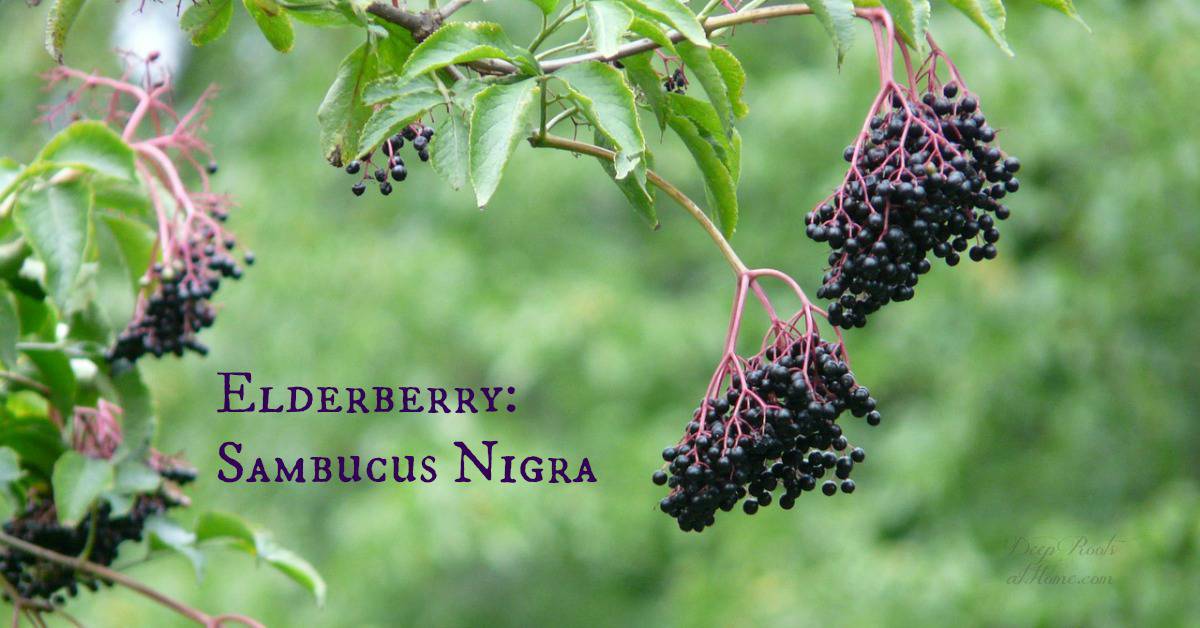
In response to my post No Flu Shots 4 Us: We Use Elderberry Syrup (99% Effective For H5N1), many have been sharing (unsolicited) anecdotally how well elderberry does for them to shorten, lessen or halt the flu altogether.
So when a mom commenter stated that her daughter Hadleigh was immunocompromised and wanted to know if taking elderberry daily could help her, I did some digging to see if there was anything in science to support that.
A person is said to have an immune deficiency or be immunocompromised when their immune system is not able to work at full capacity. This makes them more vulnerable to infections.
Let’s see what implications for the immunocompromised might be, so you can make your own conclusions.
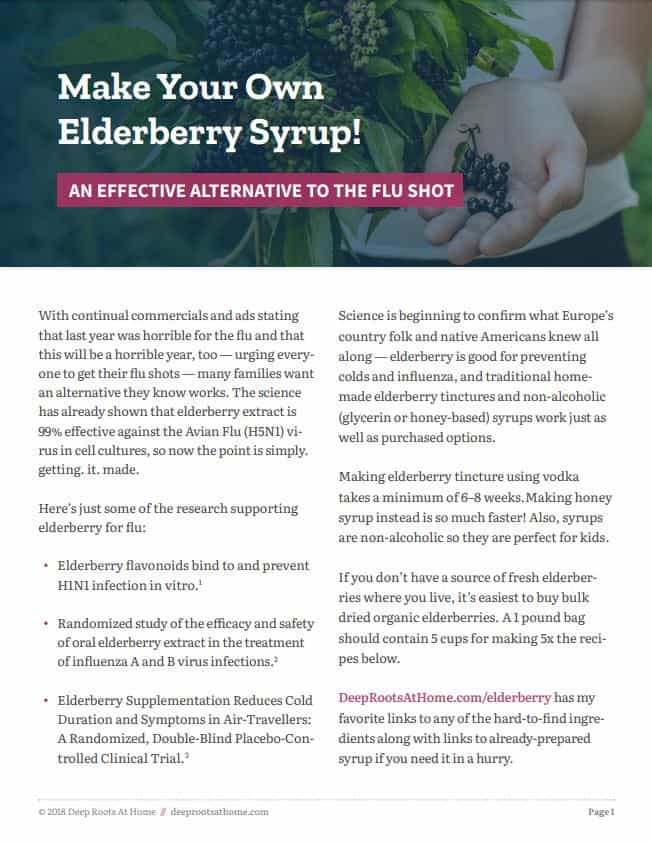
Pro Elderberry Studies:
1. This 2017 study is remarkable (for Pandemic), so I start with it. While the title is unassuming [A Mechanism to Control Influenza Virus Infection By Sambucus Nigra], this PubMed study is very important and should not be missed in a study of elderberry’s efficacy. Summarized briefly:
- “The direct transmission of avian influenza viruses to humans may raise serious threat to public health and control of pandemic influenza.”
- “The H9N2 subtype is high on the list of candidates for next pandemic because of its expanding geographic distribution, circulating in multiple avian species and repeatedly infecting mammals including pigs and humans (1,2). “
- “…a significant decrease in H9N2 virus titer and viral protein synthesis were shown in elder fruit (EF) treated cells, indicating the herb affects either entry of viruses or inhibits virus particle release.“
2. Randomized study of the efficacy and safety of oral elderberry extract in the treatment of influenza A and B virus infections. (The Journal of International Medical Research and PubMed)
3. Inhibitory activity of a standardized elderberry liquid extract against clinically-relevant human respiratory bacterial pathogens and influenza A and B viruses. (validates #2 above) (PubMed)
4. London-based research company, Retroscreen Virology, Ltd. revealed that black elderberry extract has a significant level of efficacy against the H1N1 virus (Swine Flu Pandemic Strain). Search this so see the PDF file as there is no link provided.
- Based on the results of the study, it’s highly effective in combating the flu as well as the accompanying symptoms of aches, pains, and fever. Researchers have discovered evidence of elderberry-based medications dating back to ancient Greece. Historically, the virucidal substance in elderberries was used to combat a variety of maladies including colds, flu, burns, cuts, toothaches, and even the plague.
5. Inhibition of several strains of influenza virus in vitro and reduction of symptoms by an elderberry extract (Sambucus nigra L.) during an outbreak of influenza B Panama. (PubMed)
- “Considering the efficacy of the extract in vitro on all strains of influenza virus tested, the clinical results, its low cost, and absence of side-effects, this preparation could offer a possibility for safe treatment for influenza A and B.”
6. Sambucus nigra extracts inhibit infectious bronchitis virus at an early point during replication “probably by rendering the virus non-infectious.” (PubMed)
7. Elderberry Supplementation Reduces Cold Duration and Symptoms in Air-Travellers: A Randomized, Double-Blind Placebo-Controlled Clinical Trial (PubMed)
- In recent times, elderberry has gained popularity in research and the wider community due to its reported antioxidant [18], antidiabetic [19], anti-inflammatory and immune-modulating [20], as well as antidepressant [21] properties.
8. Polyphenolic content, antiradical activity, stability and microbiological quality of elderberry (Sambucus nigra L.) extracts. (PubMed)
9. Inhibition of proinflammatory activities of major periodontal pathogens by aqueous extracts from elder flower (Sambucus nigra). (PubMed)
10. When Not to Use Elderberry: Pregnancy during an Epidemic
11. Can Elderberry Trigger a Cytokine Storm When You Have Influenza?
Cons:
Links I found when searching “Elderberry is harmful, dangerous”.
1. Elderberry, by WebMD “A specific elderberry juice syrup seems to relieve flu symptoms and reduce the length of time the flu lasts when taken by mouth within 48 hours of the first symptoms. Taking elderberry lozenges within 24 hours of the first symptoms also seems to reduce flu symptoms. Relief seems to occur within 2 to 4 days of treatment for most people. Taking a product that contains elderberry juice and echinacea also seems to relieve symptoms and reduce the length of time flu lasts. It seems to work similar to the prescription drug oseltamivir (Tamiflu).” Note: Tamiflu: Adults and Kids at Risk for Neuropsychiatric & Behavior Disturbances
2. Elderberry Benefits and Dangers, by Healthline “Elderberry is one of the most commonly used medicinal plants in the world. Traditionally, Native Americans used it to treat infections, while the ancient Egyptians used it to heal burns. Today, elderberry is most often taken as a supplement to treat cold and flu symptoms. However, the raw berries, bark and leaves of the plant are also known to be poisonous and cause stomach problems.”
3. Toddlers & Elderberry Supplements, by SFGate “Elderberry is available in capsules as well as in syrups and tinctures. However, elderberry supplements have not been approved by the U.S. FDA for the treatment or prevention of any medical condition. Do not give a supplement containing elderberry to a toddler without consulting a pediatrician.”
4. Wikipedia: Sambucus See sections “Traditional medicine” and “Potential toxicity”
5. The Poison Plant Patch: Poison Location – Seeds, bark, leaves, flowers, and unripened fruit of elderberries.
6. ELDERBERRY, by Natural Medicines Comprehensive Database “Possibly Safe…when elderberry fruit extract is used orally, short-term. One specific elderberry fruit extract (Sambucol, Nature’s Way) has been safely used for up to 5 days. Possibly Unsafe …when elderberry leaves, stems, unripe fruit, or uncooked fruit is consumed…Ingestion of large quantities may cause serious toxicity.
Elderberry is deemed GRAS and therapeutic so it may be a help to the Immunocompromised
Note: In none of the above studies was there mention of toxicity when used properly. It is GRAS (generally recognized as safe). In this brief CDC article, it was reported that “while elderberries may be safe to consume, particularly if cooked, uncooked berries may produce nausea.”
Elderberry Dosage: See dosages here.
*** Quick side note on dosing, especially if immunocompromised— elderberry, like anything that initiates an immune response, is promoting inflammation in the body. Usually this inflammation is nature’s process for bringing the heat on pathogens and clearing them.
Two things to note on this— 1. It should not be used daily, indefinitely, or even through an entire season. Healthy Inflammation should be an acute response. Only take elderberry at very first sign of illness or exposure thru illness duration.
***Those with autoimmune diseases, such as Hashi’s (low thyroid), RA, Celiac’s, otherwise immunocompromised, etc. should use all immune stimulants carefully, depending on your individual response. When the immune system is initiated, it can also trigger symptoms and change in your autoimmune condition— so, yes, small short dosing duration, and just watch your body and symptoms and use a sensible approach. No one size fits all.
Conclusion:
Based on my research, our family has grown up, made and taken elderberry tincture and syrup (only when we feel like we may be getting sick) for over 12 years, but you need to be the judge and observe your own body. Consult your personal doctor.

Do we take Elderberry all flu season?
My theory is this….I take it (1 tsp. a day) when I am feeling run down or tired, and definitely when I feel like I am getting something (1 tsp. 3-4 times a day). I don’t want my body to rely on any one thing and let down doing its job… same with garlic, ginkgo, etc.
I keep dry berries on hand as safeguard for our family and others in the event of a pandemic. I would not hesitate to at least offer it to someone for the recommended limit of 5 days (see Cons #6 above) who is immunocompromised in the event of a serious outbreak in order to give them a chance for survival.
We can’t specifically recommend it to you, but I can tell you we have not had the flu in at least the last 6 years…
“All that man needs for health and healing has been provided by God in nature, the challenge of science is to find it.” ~Paracelsus (1493-1541)
©2024 Deep Roots at Home • All Rights Reserved
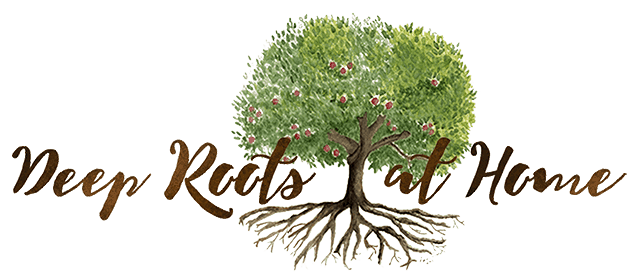

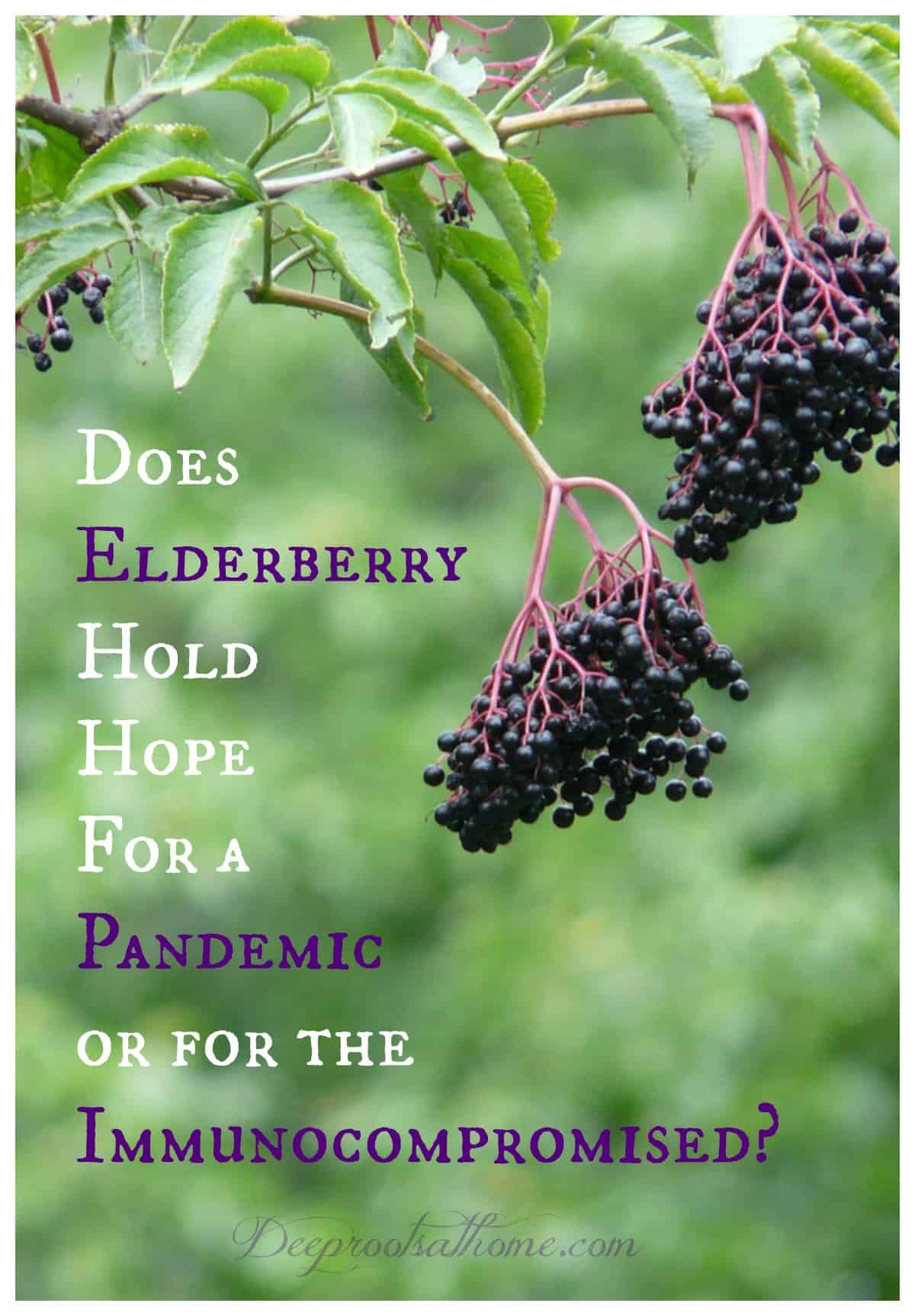

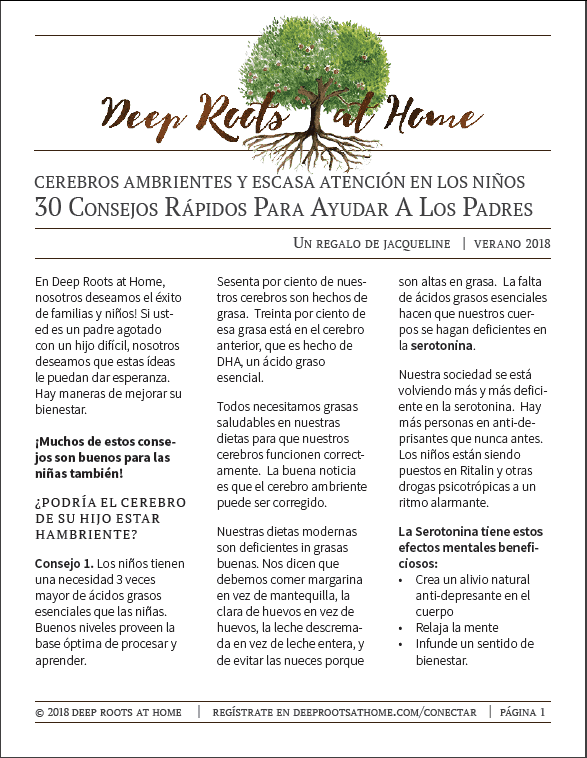


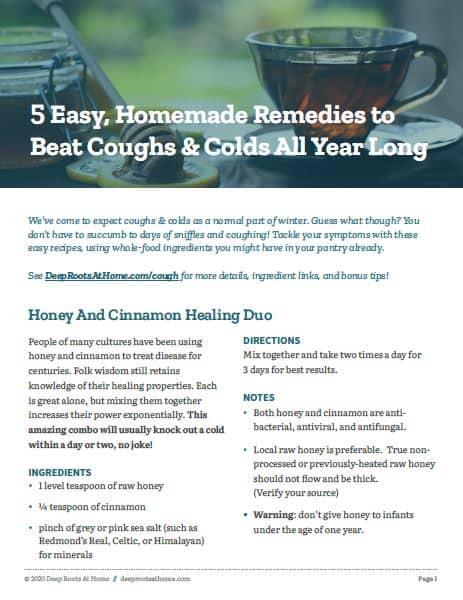
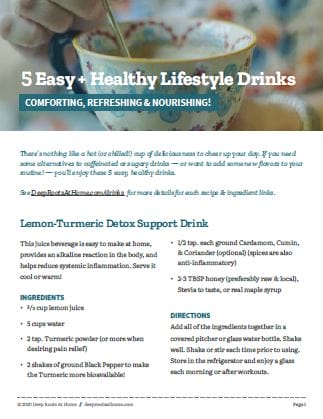
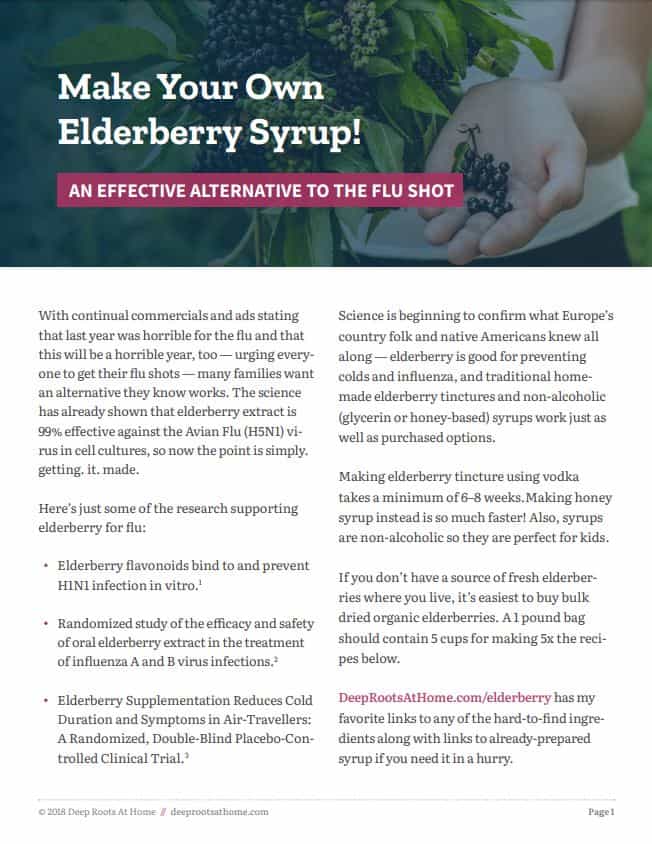




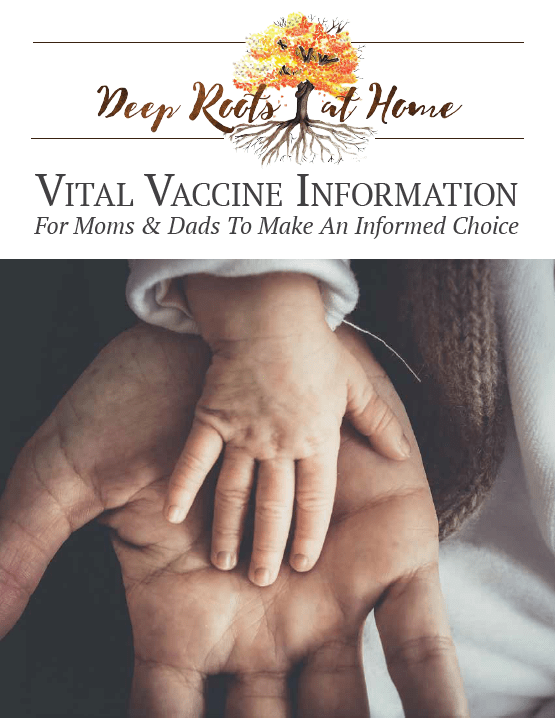

Leah G
Jacqueline, I really appreciate this post. I’m looking to find a source for Elderberry plants to plant at my parents house. Would you have any resources for that?
Jacqueline
Hi, Leah! If you search on the sidebar for a post entitled “elderberry roundup”; in one of the earlier elderberry posts listed there are links to where we got ours. I am out of time right now, but if you can’t find that fairly easily, get back with me and I’ll search it out for you! Big hugs to you and yours! Jackie
Ben Love
Just wondering if you have any input on elderberry with Corona virus-19. I am a believer in elderberry and use it every flu season myself. I have seen several Facebook posts discouraging use of elderberry during this epidemic. I disagree as there have been no studies done on this drug to verify one way or the other. Can you provide any additional information from a personal opinion.
Jacqueline
Yes, Ben, I do! I just wrote this a couple days ago and feel confident it is the true case of the situation. Lots of people throwing sensationalism out there:
https://deeprootsathome.com/can-elderberry-trigger-a-cytokine-storm-when-you-have-influenza/